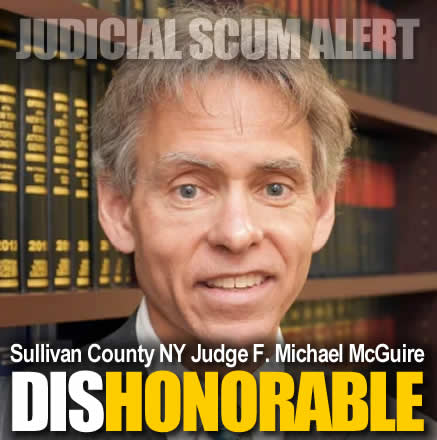
By Erik Ortiz
When litigants anger Michael F. McGuire, the county judge in New York state’s Catskills region, he might hit them with “judicial contempt” and order them handcuffed or, in extreme cases, jailed for 30 days.
McGuire, who was elected in Sullivan County in 2011, did it several times over the years without warning: to a man who asked him to recuse himself because, he said, McGuire knew his son, to a mother who had an outburst when she felt ridiculed by McGuire and to a grandmother who contested turning over her grandson to his allegedly abusive father.
That wasn’t his only concerning behavior, according to an ethics complaint filed in 2018 by a state watchdog agency, which accused McGuire of berating court staff members; making “undignified” comments, such as suggesting that people in his court would date a “drug dealer” or a “slut”; presiding over cases in which his impartiality could be called into question; and representing family members and friends in personal cases. The watchdog agency, the New York State Commission on Judicial Conduct, said he “lacked candor” during its investigation.
For his pattern of “serious” judicial lapses, a state appeals court agreed last year that McGuire — who earned a salary of $210,161 a year — be removed from the bench, the harshest sanction a judge can face. The public, however, had learned about the ethics charges only months before, in March 2020, more than a year and a half after McGuire was first served with the ethics complaint and when the appeals court said he had been notified of the commission’s unanimous recommendation to punish him.
McGuire ended up resigning in May 2020, but with another job already lined up — as Sullivan County’s head attorney, a position he still holds.
McGuire did not respond to requests for comment. In his resignation letter last year, he wrote that “I am quite proud of our achievements” on the bench and “deeply regret the issues that brought me before this Court.”
Joseph LaPiana, who went before McGuire in a family court case last year and is unable to see his 1-year-old daughter as a result, said, “Judges work for the public — we should know if they are being investigated for any misconduct.”
If McGuire’s misconduct violations had happened in a neighboring state, like New Jersey, Pennsylvania or Vermont, the public would have been alerted earlier — at the outset of the filing of ethics charges.
The timing in when the public is allowed to know about allegations against judges can differ broadly among states. Some allow judges to go months or years before even credible complaints are in the open. As more than 100 million cases are filed in local and state courts every year and as judges exert near-absolute power in deciding who wins custody of children to who can get married to whether people go to jail, the public’s ability to scrutinize judicial conduct is crucial for transparency’s sake, and it deserves as much attention as recent calls for policing and prosecutorial overhauls, judicial ethics experts argue.
Judicial misconduct “undermines confidence in our justice system,” said Susan Saab Fortney, the director of the Program for the Advancement of Legal Ethics at Texas A&M University School of Law.



